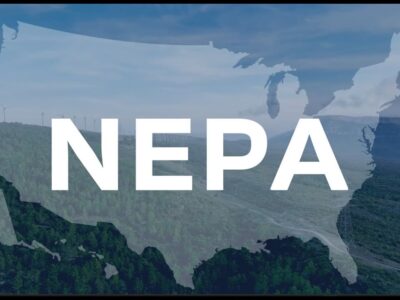permitting reform
A start on feasible permitting reform
A proposal from the National Governors’ Association is narrow and focused, and that’s good
I’ve written recently about the difficult politics of permitting reform at the federal level. But that doesn’t mean that there isn’t important work to be done. It does mean that successful proposals will have to be, as I wrote, low salience, thoughtful, and unlikely to provoke polarization. The National Governors’ Association has just come out …
Continue reading “A start on feasible permitting reform”
CONTINUE READINGHow broad does Clean Water Act 401 certification sweep?
Recent disputes over infrastructure projects highlights the importance of the question
Another issue for ping-pong governance over the past few years has been certification under Section 401 of the Clean Water Act. For those of you who are not deep into the weeds of the Clean Water Act, Section 401 requires (a) federal agencies that are issuing licenses or permits that (b) result in discharges to …
Continue reading “How broad does Clean Water Act 401 certification sweep?”
CONTINUE READINGProblem solved?
Bipartisan proposal for permitting reform from Problem Solvers Caucus is a good first step, but has much more work to do
The permitting reform conversation continues in Congress – this time with a long set of proposals from the bipartisan Problem Solvers Caucus, based on a range of conversations with different stakeholders and interest groups. There is much that is good in this set of proposals, but there are also proposals that require more thought, or …
Continue reading “Problem solved?”
CONTINUE READINGReinventing NEPA
What do we really want NEPA to do? And what’s the best way to do it?
Imagining reform legislation from Congress is difficult, but it’s worth imagining, if only as a thought experiment, how we could do better. I would suggest we start by asking what we can expect NEPA to accomplish after fifty years of judicial decisions and agency practice – and whether there are better ways of accomplishing those things.
CONTINUE READINGPermitting reform in the Trump Administration
It’s hard to do a deal when one side can’t be trusted to keep their side of the bargain
There’s more chatter about permitting reform again in Congress. I’m supportive of the concept, and thought the deal on the table at the end of the Biden Administration was probably worth doing. So there are now bipartisan efforts to amend NEPA, and also to do a broader permitting reform bill. I’ll leave specific analyses of …
Continue reading “Permitting reform in the Trump Administration”
CONTINUE READINGSPEED bump?
Recent proposal for NEPA reform in House of Representatives is sweeping and perhaps counterproductive
The House of Representatives recently held a hearing on the SPEED Act, a proposal for NEPA reform advanced by Representatives Westerman (R-Arkansas) and Golden (D-Maine). While the public announcement by the majority for the bill is that it is simply “commonsense upgrades,” a close review indicates that it would produce potentially dramatic changes to NEPA, …
Continue reading “SPEED bump?”
CONTINUE READINGAnother Attempt to Measure NEPA’s Impact
This most recent report is better, but still has significant flaws
The Breakthrough Institute has produced another report on litigation under the National Environmental Policy Act (NEPA), building on a report it prepared earlier, which I sharply criticized in this prior blog post. The updated report is a mixed bag: It doesn’t solve many of the methodological issues I identified in the earlier blogpost; it does …
Continue reading “Another Attempt to Measure NEPA’s Impact”
CONTINUE READINGMajor permitting reform will (likely) be bipartisan
Senate parliamentarian shoots down effort to use “pay to play” to avoid judicial review of NEPA
Several weeks ago I wrote about an effort by House Republicans to use reconciliation, a process which avoids the Senate filibuster, for a “pay to play” proposal to gut NEPA. The proposal would have allowed sponsors of projects going through NEPA review to pay an extra fee and avoid judicial review of the NEPA review. …
Continue reading “Major permitting reform will (likely) be bipartisan”
CONTINUE READINGThe $133 Million Bat Tunnel
Here’s what permitting reform in the United Kingdom can teach the United States about building and abundance.
“We’ll rip out ‘insane’ environmental rules that block growth.” “We can’t get anything built anymore. Everything takes too long.” “We will streamline environmental obligations. We will limit the cynical legal challenges that block major infrastructure projects. We will strip away the years of consultation that drown builders.” You might well expect these threats and worries …
Continue reading “The $133 Million Bat Tunnel”
CONTINUE READINGA Stealth Repeal of NEPA
Proposal from House Natural Resources Committee would effectively repeal NEPA
The Republican-controlled U.S. House of Representatives is working on reconciliation language – legislation that can pass via a majority-vote in the Senate, but only so long as it relates to fiscal matters. It looks like House Republicans are going to try and use the reconciliation process to effectively repeal the National Environmental Policy Act (NEPA). …
Continue reading “A Stealth Repeal of NEPA”
CONTINUE READING





